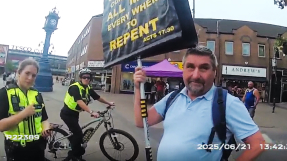Ukraine Patriarch Believes No Obstacle between Orthodox- Roman Catholic Dialogue
Since Pope Benedict XVI declared that healing the divide between the Roman Catholic and Orthodox churches should be one of the top priorities of his papacy, after he was elected two months ago, leaders from both churches have been continuously expressing individual opinions, even though no concrete plans have been laid down for the dialogue so far.
The Russian Orthodox Church appears to be quite conservative in terms of its position in the ecumenical dialogue with the Vatican. According to the Associated Press, the Moscow Patriarchate accuses the Catholics of encroaching on its territory and blocked the late Pope John Paul II's long-held wish to visit Russia, the world's most populous Orthodox nation.
Russian Orthodox Patriarch Alexy II, in the Wednesday edition of the Russian government daily Rossikaya Gazeta, said the Vatican would have to make the main effort to heal troubled relations between the two churches.
"We warmly welcome recent statements by Pope Benedict XVI in which he spoke of Christian unity and the need for concrete steps to improve ties between the churches. We hope that such steps will be made by the Catholics in order to change for the better Orthodox-Catholic relations," he told the newspaper.
Patriarch Filaret, head of the Ukrainian Orthodox Church's Kiev Patriarchate, however, showed optimism to the dialogue in a statement made to the Associated Press on Wednesday. Whilst acknowledging that unifying the two churches is "desirable but today it is not realistic", he believed greater cooperation is possible.
"Today the task and mission of Christian churches- Orthodox, Catholic, Protestant- is to support moral values and support spirituality and morality in European civilisation," Filaret told AP. "We don't need to be afraid of Rome, or the Greek Catholics."
The General Secretary of the World Council of Churches (WCC) Rev. Samuel Kobia also welcomed Patriarch Filaret’s comment. Currently, Orthodox churches are members of the WCC while the Roman Catholic Church is not.
In the recent Conference on World Mission and Evangelism sponsored by the WCC held in Athens last month, delegates from the Roman Catholic Church participated as observers. Kobia was in Rome to meet with Pope Benedict XVI on Thursday. As the world’s most powerful ecumenical organisation, the WCC may become a bridge of the dialogue between the Vatican and Orthodox Church.
Kiev Patriarch Filaret, further stressed that "the churches (Orthodox and Roman Catholic) have much in common and should cooperate in emphasising the importance of the family and moral values."
Ukraine, as a former Soviet republic has gained independence, and has a comparatively more open stance towards the dialogue with the Vatican.
The Kiev patriarchate, which claims independence from Moscow and has more than 2,700 congregations throughout Ukraine, warmly welcomed a papacy visit by the late Pope John Paul II in 2001 despite the Russian Orthodox Church’s strong opposition.













